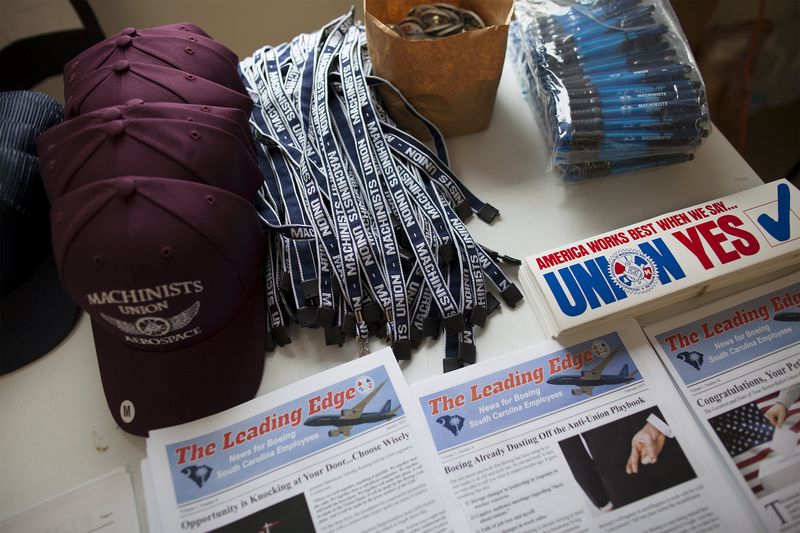By Colleen Jenkins
(Reuters) - South Carolina Governor Nikki Haley considers the bid to unionize workers at Boeing Co's North Charleston plant a threat to one of her state's corporate crown jewels, and she is turning to radio, speeches and social media to denounce the campaign.
"We don't need their bully middleman tactics between our associates and their employer," she wrote on Twitter (NYSE:TWTR) last month. It was a message in keeping with Haley's previous declarations that she is a "union buster" who wears high heels to kick out organized labor "thugs" seeking to gain a foothold in the state.
The April 22 union vote at the aircraft maker's 787 Dreamliner factory in the state could offer Haley a chance to burnish her conservative credentials at a time when potential Republican contenders for the White House court her ahead of South Carolina's early primary in 2016.
If she stands up to Boeing's biggest union, the International Association of Machinists and Aerospace Workers (IAM), and wins, it could enhance the second-term governor's prospects for higher office, political experts said. That could include a Cabinet post in a future Republican administration, a national party leadership position, or even being a vice presidential running mate in 2016.
Her anti-union position "very much bolsters her with conservatives around the country," said South Carolina-based Republican strategist Chip Felkel.
A hard-line stance against unions already raised the profile of Haley's friend and fellow governor, Scott Walker of Wisconsin, who is an early favorite in the race to become the Republican presidential candidate, though he has yet to declare he is running. Walker cut back collective bargaining rights for public sector workers in a state with deep labor roots and survived a 2012 recall campaign sparked by his labor reforms.
Haley faces far less political risk in South Carolina, which federal data shows had the second-lowest union membership rate in the country in 2014 at 2.2 percent of wage and salary workers. South Carolina has for many years had a "right-to-work" statute that allows employees to decide whether or not to join or pay dues to a labor union, and prevents unions and employers from reaching agreements that require employees to join a union.
As a result, party strategists doubt she will gain as much momentum as Walker by fighting a union in the private sector.
PUBLIC WARNING
Georgetown University labor historian Joseph McCartin said Haley's effort is akin to the one last year by Tennessee Governor Bill Haslam and U.S. Senator Bob Corker, two Republican politicians who successfully campaigned against the United Auto Workers' efforts to unionize a Volkswagen plant in Chattanooga.
"To be a successful Republican, especially on a national level, you really have to show your anti-union credentials in a really overt way," McCartin said.
Haley, 43, has already seen her political fortunes rebound after a sometimes rocky first term marred by a massive data breach at the state's Department of Revenue and after she was fined and given a public warning by the State Ethics Commission for failing to report the addresses of some political donors.
Last fall, she clinched a decisive victory for a second-term. In February, a Public Policy Polling survey found her with a 51 percent approval rating, her highest number yet in that poll as governor.
The daughter of Indian immigrants, she is both the first woman to be governor of South Carolina, and the first from an ethnic minority, rare attributes in the Republican party and a help in gaining her attention in national circles.
Another Republican strategist, who spoke on condition of anonymity, said Haley's edgy remarks about unions might play well with the party base but could cost her support beyond South Carolina.
"She's smart to be positioned where she is on the issue," the strategist said. "I'm not sure, however, that the bluntness of her comments would serve her as well nationally outside the Republican base."
Democrats and union leaders criticize Haley for wading into the current union campaign on Boeing's behalf, arguing there is no place for politics in the decision by the Boeing workers.
So far, Haley has been featured in a radio ad for the company in January in which she urged workers at the Boeing plant in North Charleston to stay union-free. She also dedicated a significant portion of her annual State of the State address to the topic.
A key part of her message is to portray the IAM as hypocrites for seeking to represent approximately 3,000 Boeing workers in South Carolina, despite previously fighting to stop Boeing from moving some of its aircraft production to the state.
Boeing's $750 million South Carolina operation opened in 2011, the year Haley took office. The IAM argued the plane maker built the plant in retaliation for a 2008 machinists strike at Boeing's massive plane-building complex in Everett, near Seattle in Washington state.
A year ago, the IAM opened an office in North Charleston to educate Boeing workers about collective bargaining, and its campaign is focused on wages, hours, working conditions and dignity on the job, according to its lead organizer.
A Boeing spokeswoman would not comment on Wednesday about whether the company would further enlist Haley's help in the weeks ahead of the union election.

A spokeswoman for Haley said the decision ultimately will be made by Boeing workers, not politicians. But the governor is characteristically unapologetic about using her pulpit to make her position on unions known. "They should pack their bags, head back to Seattle and stop trying to steal the success of the workers at Boeing South Carolina," Haley press secretary Chaney Adams said.